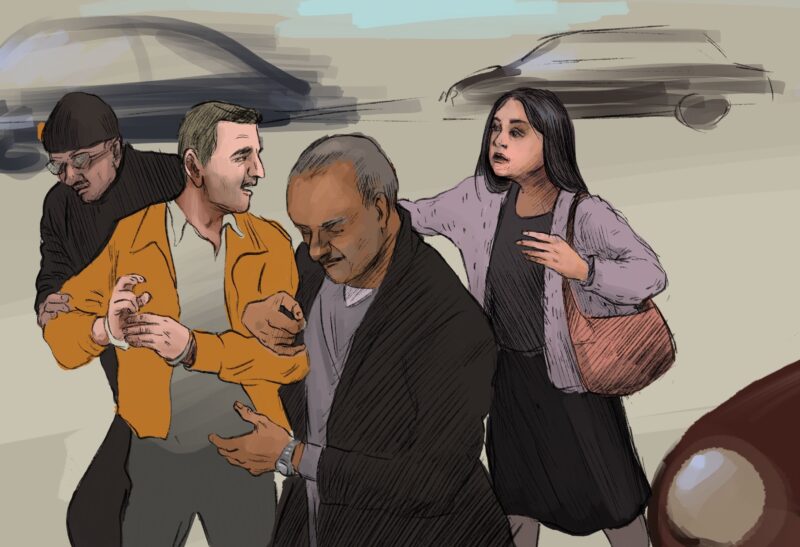Murad Soltanov, 25, who had a mental disorder, was killed a month ago in the town of Shabran in northern Azerbaijan. At his father’s request, six ”
exorcists
” beat him so badly he died of his injuries. Shortly after news of this tragic incident reached the public, it became clear that this had not been Murad’s first exorcism.
While the investigation continues to determine whether the tragedy was an accident, theologians are actively commenting on it. These kinds of rites have been made up by charlatans, said one of them, Elshad Miri. He stressed that there is no such thing as “driving out demons” in Islam.
But even after this tragedy, people in Azerbaijan continue to turn to exorcists, wizards, and sorcerers for help.
Uncle Kolya’s spirit
Childag
, or “casting out fear by fire”, is the name for one of the most popular rites in the country. It is believed that the healer, or
childagchi
, removes a curse from a person by cauterizing several spots on their skin. The procedure is painful and is an especially difficult experience for children.
Samir Ahadov, 46, recalls his
childag
with shudder. He was taken to a
childagchi
when he was ten years old after accidentally seeing a dead body and was struck with fear.
“Our neighbor Uncle Kolya was an Armenian; he was buried the Christian way, with his face uncovered. It was swollen and black, and I became frightened.”
Ahadov began having panic attacks and even hallucinations. During those attacks, he yelled and ran where the road took him. For his parents, who had abandoned hope of calming their son down, the cause was clear: their child had been possessed by his uncle’s spirit. They decided to see a
childagchi
.
“There, they removed my clothes all the way to my waist and rolled up my pant legs. An elderly man set fire to a rolled piece of cloth and applied it to different parts of my body, one after another. It was very painful, and I twisted and turned with pain,” recalls Samir.
Despite regular visits to the
childagchi
, the boy continued to experience similar attacks for several years, but his parents never took him to a doctor.
Fear against fear
The
childag
, Samir was taken to 35 years ago, continues his operations today. Located in the village of Mashtaga on the outskirts of Baku, here masters of “casting out fear” pass their skill generation to generation. The current
childagchi
, Haji Aga, says that the
childag
had operated in Mashtaga since anyone can remember, and the rite of casting out fear was no less popular in Soviet years than it is today. Among the
childagchi’s
regular customers are even officials who visit him. However, he refused to disclose the names or positions of these government employees.
Casting out fear means cauterizing one’s skin with a smoldering tube made out of a piece of cloth. Touches on the “patient’s” forehead, temples, neck, arms and legs cause convulsive winces, through which, it is believed, fear “leaves” the body. It is believed that children go through a more sparing procedure, but Meydan TV reporters, who attended the “treatment” of a five-year-old girl who was familiar with the rite, witnessed her hysterical crying in anticipation of the procedure.
“If a person’s body gets covered in goose bumps during the session, it means that the person has taken a huge freight, and more sessions may be necessary,” Haji Aga explains.
There is no specific price set for these kinds of services, and people normally pay
childagchi
“whatever they can afford”, most often between 1 and 5 AZN (1-3 USD).
In comparison, a visit to a district therapist will cost one at least twice as much. Although official healthcare is free for citizens in Azerbaijan, in reality, patients often must bribe doctors in order to secure treatment.
The worse the healthcare, the more magicians
Sociologist Javid Imamoglu believes that the popularity of magicians and sorcerers is not only due to the low quality of the education and people’s financial problems, but also the lamentable state of healthcare.
“Educated people with a broad outlook, indeed, normally look for specialists to have their problems resolved,” Imamoglu told Meydan TV.
Nevertheless, you can almost always come across intellectuals among people in the line to see a
childagchi
.
“In cases where medicine is powerless, people hope for a miracle and visit magicians. The poor quality of healthcare is one more reason for the popularity of these kinds of crafts. The more “patients” sorcerers in Azerbaijan is a telling symbol for how lamentable the healthcare is.
Doctors sometimes refer their own patients to a childagchi, the Mashtaga healer Haji Aga argues: “When they cannot make a diagnosis, they themselves send their patients to me.”
Legal magic
The law does not regulate the activities of magicians, sorcerers, wizards, or fortune tellers in Azerbaijan. Therefore, they cannot be banned from carrying out these activities, says lawyer Samira Agayeva.
“But theoretically, we can talk about having criminal proceedings launched due to swindling,” Samira Agayeva says. She notes, however, that she is not aware of any precedent of the sort.



